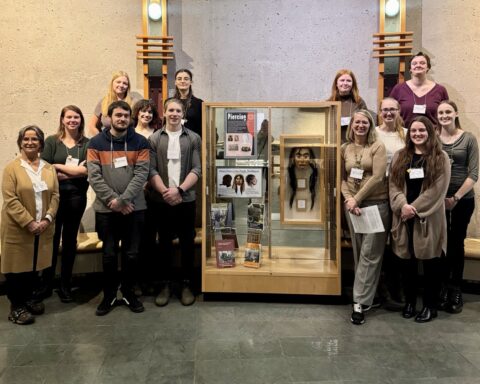Description: The Life of a Researcher – a UNBC research ambassador created a series focused on showing the world a glimpse of what life is like as a “researcher”. This first article features Zachary Fleck, a student completing his undergraduate studies majoring in Global and International Studies this year at UNBC.
Title: A Summer in the Life of an Amateur Qualitative Researcher
Author: Zach Fleck (Research Ambassador 2020/2021)
Zach, ‘the social sciences guy’, here. Between this past April and August, I wrote a research proposal, completed an ethics review process, gathered research participants, conducted and transcribed interviews, and then compiled and analyzed data in a final research report as part of a Global and International Studies independent study course here at UNBC. I was fortunate enough to be granted this research opportunity as a senior undergraduate student. In this post, I will give a brief description of each aspect of my summer project. If you are wondering what research can look like in the social sciences, read on!
Tribulations of an inexperienced researcher
Back in January, I took my first crack at conducting original research. As a student in the Global and International Studies capstone course, my task was to design a small-scale research methodology on a sustainability-related topic and implement it to the best of our (largely non-existent) research abilities. Our instructor, Dr. Tristan Pearce, emphasized that we should consider what we were realistically capable of (probably not much considering we all had zero formal research experience) and then pare that down, even more, assuming that we would overestimate our own potential. Giving in to my stubborn and self-righteous nature, I chose to ignore his sage advice. I decided I wanted my research to answer the question, ‘How do domestic and Chinese international students form relationships?’. A trivial research question, I thought to myself at the time. How wrong I was. To make matters worse, the methods I devised to answer the question were even more convoluted than the question itself. I chose to take a ‘mixed-methods’ approach to my project, wherein I planned to collect quantitative data from surveys and qualitative data from interviews. Unbeknownst to me, drawing rigorous conclusions from quantitative data requires at least some knowledge of statistical analysis, which I did not possess. Trying to connect my quantitative and qualitative data complicated things even more. To make a long story short, my final research report ended up being more of a final research quagmire.
Retrieved from: https://forums.penny-arcade.com/
Fortunately, thanks to the expert and inspirational guidance of Dr. Pearce, I learned a lot and was undeterred despite my ordeal. In fact, I was emboldened. Dr. Pearce generously obliged to guide me once again, suggesting a simpler research question and methodology. So, I drafted a research proposal and literature review for a project aimed at documenting the experiences of international students at UNBC, this time planning to take a purely qualitative approach.
What is qualitative research? Why is it important?
Broadly, qualitative research involving human participants is undertaken to better understand the lived experiences of individuals (Hay 2016). In presenting descriptive accounts of human experience, analyzing qualitative data can tell us things that quantitative data might not.
A common misconception is that qualitative research is less authoritative than quantitative research. Qualitative research is generalized as representing the subjective, while quantitative research represents the objective. Hay notes this generalization is too simplistic, and that quantitative research is also ‘value-laden’ and never ‘interest-free’, claiming researchers are just as likely use assumptions when interpreting quantitative data (2016). Conversely, qualitative methods are less likely to produce ‘generalizable’ findings, where one study might be applied to others (Hay 2016). Ideally, both approaches should be referenced before coming to conclusions about research problems related to human behavior (Hay 2016).
In the case of my own research, qualitative methods were a good fit because of the ‘exploratory’ nature of the research question. Unsurprisingly, nothing has been documented about the experiences of international students during a global pandemic. Qualitative methods would allow me to ask open-ended questions to illicit descriptive answers, then try to decide which aspects of international students’ experiences were most important. A study like this usually aims to inform future research efforts, rather than draw generalizable conclusions about the research question.
Ethics review
Doing qualitative research often implies working with human participants. This means that a research ethics review process must be completed before the research can be undertaken. In the past, some researchers have employed what would now be considered dangerously experimental and exploitative research techniques (just think along the lines of high voltage, LSD, and unsuspecting young children).
It’s alive!!!!! Retrieved from: http://haraldjohnson.com/its-alive/
Research ethics policies have since been developed to ensure that proposed research methodologies respect the health and dignity of research participants and that any potential risks to the participants are adequately balanced by the potential benefits to society and the participants themselves.
Navigating ethics reviews can be a time-consuming and frustrating aspect of the research process, especially for inexperienced researchers. Research ethics boards meticulously scrutinize all applications to ensure that the proposed research aligns with requirements. Any aspect of the application which is not clearly defined or where risk is not adequately considered will result in the document being returned with suggested revisions. Thankfully, Dr. Pearce was able to provide a framework which allowed me to stumble through my first research ethics board review and retain my sanity in the process. Still, our application was returned three times for revision over a month-long period, even though the research to be undertaken was of decidedly ‘minimal risk’ to participants.
Excluding human participants from research methodologies just to avoid research ethics would be unwise in certain cases. On the other hand, an inexperienced researcher should strongly consider project timelines and access to a competent mentor before proposing a project involving human participants.
Gathering participants
A strategy for how to access data is a crucial part of the initial planning process. The soundest research methodology is useless without any data. In the case of my research, accessing data was simple. I already had quite a few connections with UNBC international students, some of whom were friends of mine. You may be wondering, ‘Does using your friends and acquaintances as research participants compromise the integrity of the research?’. The answer is, it depends. Qualitative research does not need to be carried out using demographically representative samples. Some studies utilize only a single participant. Further, the participants might be already known to the researcher. The key concern is that the researcher does not exploit an uneven power relationship between themselves and participants. For example, it might be inappropriate for an instructor to use their students in a research project if participating in the research is seen to possibly affect their grade in that instructor’s course. As long as the participant sampling process follows the informed consent guidelines laid out in the approved research ethics application, many different sampling strategies might be appropriate. It often helps to have a rapport with participants in qualitative research, so as long as the researcher conducts themselves professionally, including persons known to the researcher can actually be a boon to the research effort.
Interviewing participants
In the interview process, a qualitative researcher takes on the role of an investigative journalist. I conducted semi-structured interviews for my project, meaning I followed an interview guide which I was prepared to deviate from if the situation called for it. In the case of semi-structured interviews, the interviewer needs to be spontaneous should the opportunity arise to delve into an important aspect of a participant’s response. There were many times where I felt like a psychiatrist, constantly asking questions along the lines of ‘…and how did that make you feel?’. After listening to my first few interviews, I was baffled by my tendency to use the word ‘like’ about ten times each minute. I also kicked myself for moving on too quickly from a question without asking a pertinent follow-up. Dr. Pearce and I discussed how a researcher looking to improve their interviewing skills might analyze how talk show hosts interact with their guests, paying close attention to when the host chooses to interject at exactly the right moment. There are many nuances to conducting a good interview, all of which come with experience, as I am sure George Stroumboulopoulos could attest to.
Retrieved from: https://kelseymusicexpress.wordpress.com/
Transcribing interviews
Transcribing interviews is not a glamorous part of the research process. Thankfully, it is 2020 and there are many tools available which can make transcription less time-consuming. Using auto-transcription software is not perfect though, so some amount of transcribing needs to be completed ‘by hand’ to retain data integrity. For the most part, transcription is a job delegated to research assistants (AKA the redshirts of a research team, for all you Star Trek fans) involved in large projects. This does not mean transcription cannot be a valuable learning exercise. Transcribing interviews allowed me to closely reflect on my own speech patterns when conducting interviews, as well as those of respondents. When it came time to organize the data, I was already familiar with some of the themes, which would not have been the case if I had not taken part in the transcription process.
Writing the report
The most daunting aspect of my project was trying to make sense of hundreds of pages of interview data, and then condense it into a concise report. I began by categorizing all responses according to my structured interview questions. I then picked out what I thought were the ‘emergent themes’ in the data. That is the common trend in participants’ answers. Typically, multiple researchers will employ the same data analysis technique to interpret descriptive data to arrive at a consensus about what the data is saying. My project was low budget, so one data analyst would have to do. From there, I selected quotes that best encapsulated each theme to be presented in the ‘results’ section of the report. This was combined with an abstract, background literature review, description of my methodology, and discussion of results.
As an undergraduate student and amateur researcher, completing this research was a very humbling process. My final report was not flawless, but definitely work I will look back on as a building block in my journey as a lifelong learner. The process will be an instrumental learning experience for when I take on other large projects in the future. I would implore any student interested in continuing to study beyond the undergraduate level to seek out opportunities to take on self-directed research, whether it be part of an honors thesis, independent study, or research assistantship. And of course, get in touch with your UNBC research ambassadors to learn more about where to start!
- Hay, Iain. 2016. Qualitative Research Methods in Human Geography. Oxford University Press
My final report manuscript as of Aug 27, 2020:
file:///C:/Users/zflec/Documents/INTS%20499/DocumentingInt’lStudentExps.Sept14.htm










